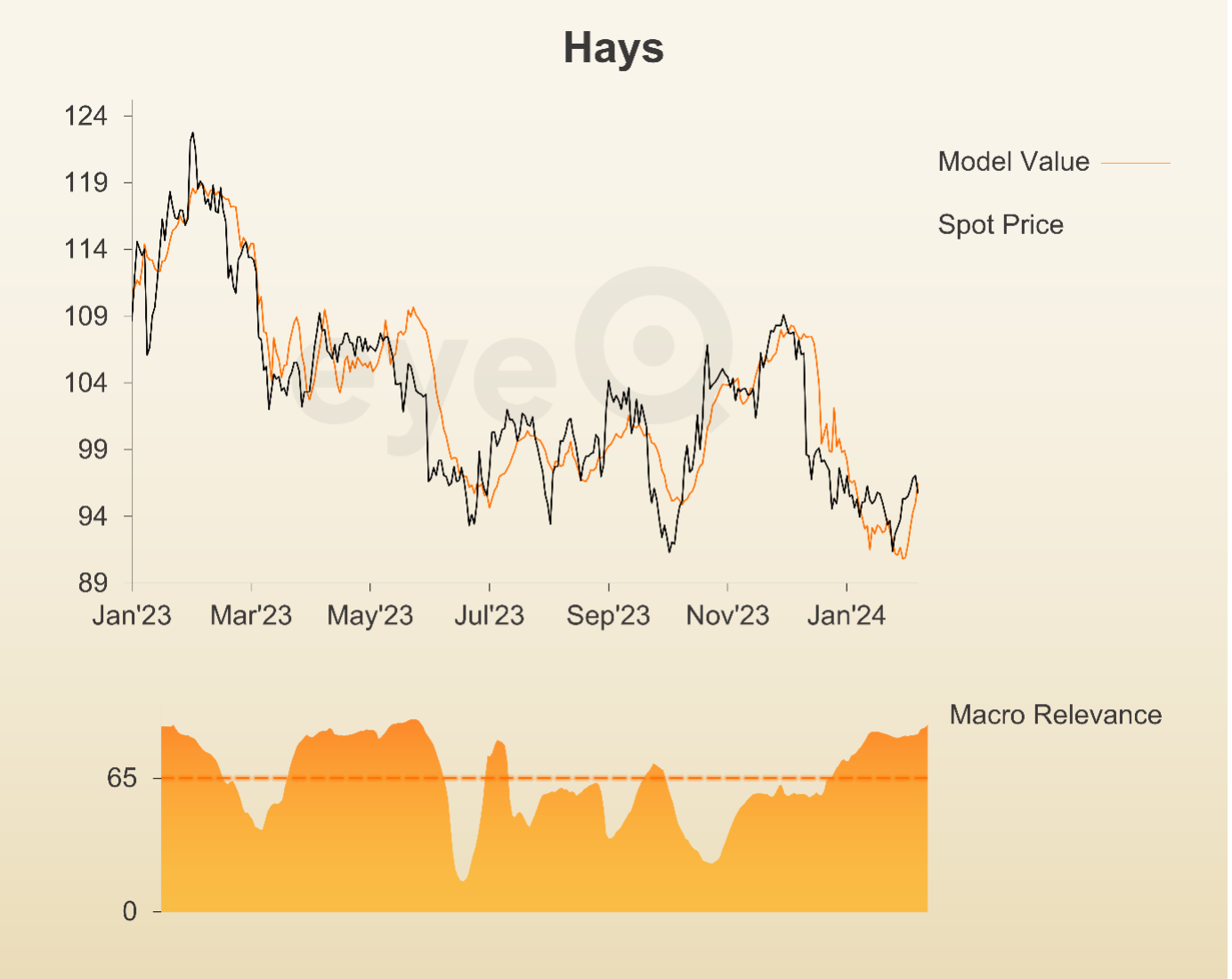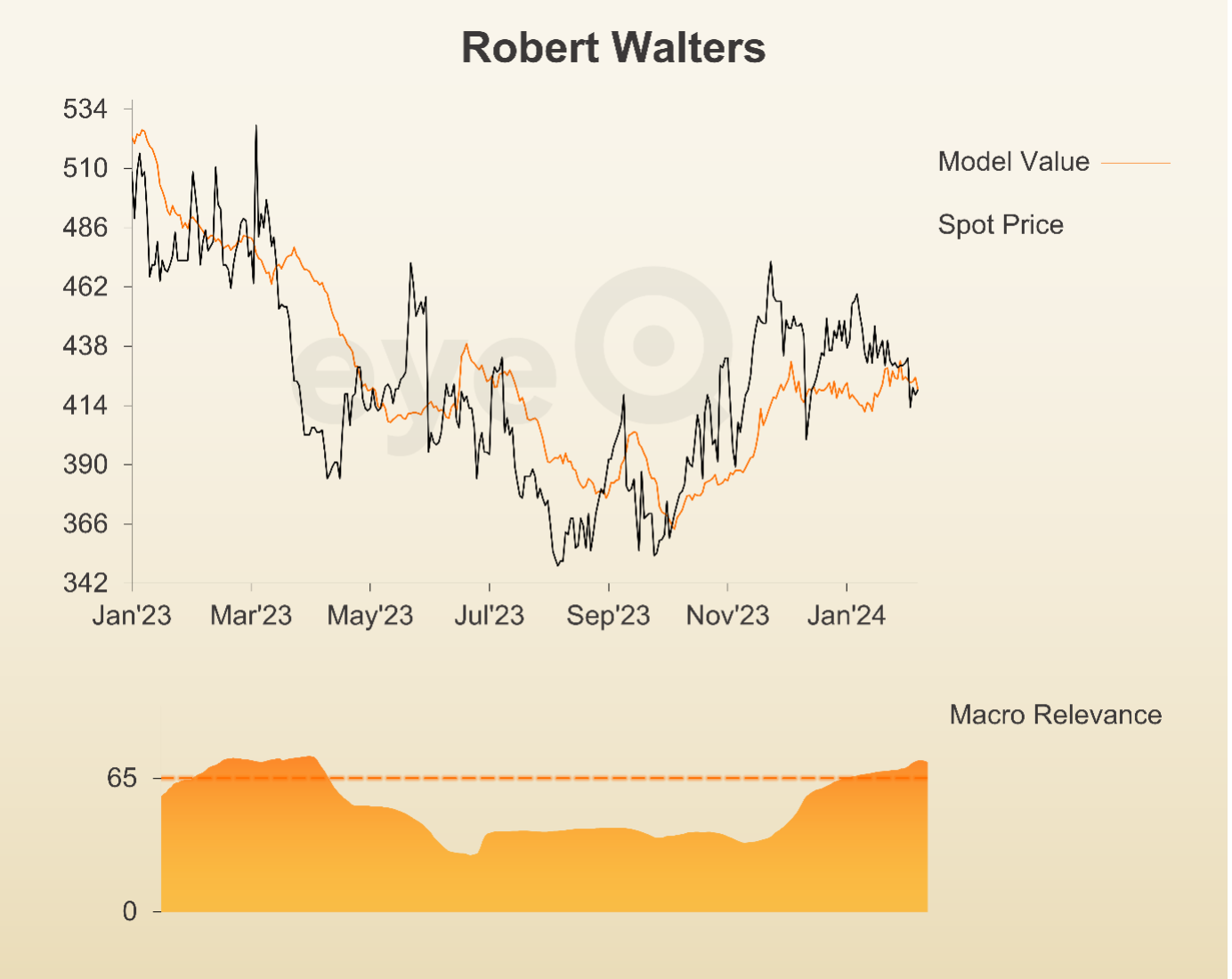eyeQ: two stocks acting as economic bellwethers
interactive investor has teamed up with the experts at eyeQ who use artificial intelligence and their own smart machine to analyse macro conditions and generate actionable trading signals. And this pair are all about macro.
12th March 2024 11:30
by Huw Roberts from eyeQ

"Our signals are crafted through macro-valuation, trend analysis, and meticulous back-testing. This combination ensures a comprehensive evaluation of an asset's value, market conditions, and historical performance." eyeQ
Discover: eyeQ analysis explained | eyeQ: our smart machine in action | Glossary
Hays
Trading signal: short-term tactical model
Model value: 96.87p
Fair Value Gap: +0.14% premium to model value
Model relevance: 91%
Data correct as at 11 March 2024. Please click glossary for explanation of terms.
Robert Walters
Trading signal: strategic long-term model
Model value: 420.33p
Fair Value Gap: -0.07% discount to model value
Model relevance: 73%
Data correct as at 11 March 2024. Please click glossary for explanation of terms.
Is the UK labour market starting to cool?
Recent data from Reed Recruitment paints an intriguing picture: job listings plummeted by 45% in the last three months compared to a year ago, reaching their lowest point since late 2020 during the initial Covid lockdowns.
Alongside this, Reed reported a 20% surge in job applications, signalling a noteworthy shift. After years of tight labour markets and rising wages, this combination hints at a shift towards fewer job opportunities and less upward pressure on wages.
While the impact on workers may be concerning, the Bank of England could find relief in cooling wage inflation – it makes potential interest rate cuts more feasible.
How should investors interpret this news? It underscores the importance of aligning company-specific information with broader macro forces. The Reed survey has had a strong track record recently. Their data was strong in 2022 when everyone feared a recession; but slowed last summer before the official statistics declared a recession.
Today’s official Labour Market statistics showed wage growth strong but slowing, the unemployment rate at 3.9% and job vacancies still on the decline. Yet, the volatility in these numbers raises doubts about their reliability, making anecdotal evidence from recruitment companies crucial for investors.
Examining Hays (LSE:HAS) and Robert Walters (LSE:RWA) on eyeQ shows:
- Hays boasts a high macro relevance score of 91% on our Short-Term model, with no Valuation Gap. The share price is behaving as macro conditions say it should. What’s more notable is those macro conditions have improved 3.6% in March.
- Robert Walters has high macro relevance (73%) on our strategic Long-Term model. Again, there is no Valuation Gap, the stock was trading rich to macro conditions but has recently “caught down” to model fair value. But this time model value is flatlining.
Currently, there's no immediate trade signal. The focus lies on monitoring macro model value, providing an early indication of potential deterioration in the UK labour market. Recruitment company share prices act as an early barometer, offering valuable insights for investors navigating this dynamic landscape.

Source: eyeQ. Past performance is not a guide to future performance.

Source: eyeQ. Past performance is not a guide to future performance.
Useful terminology:
Model value
Where our smart machine calculates that any stock market index, singe stock or exchange-traded fund (ETF) should be priced (the fair value) given the overall macroeconomic environment.
Model (macro) relevance
How confident we are in the model value. The higher the number the better! Above 65% means the macro environment is critical, so any valuation signals carry strong weight. Below 65%, we deem that something other than macro is driving the price.
Fair Value Gap (FVG)
The difference between our model value (fair value) and where the price currently is. A positive Fair Value Gap means the security is above the model value, which we refer to as “rich”. A negative FVG means that it's cheap. The bigger the FVG, the bigger the dislocation and therefore a better entry level for trades.
Short Term model
This model looks at share prices over the last four months, captures the company’s relationship with growth, inflation, currency shifts, central bank policy etc and calculates our key results - model value, model relevance, Fair Value Gap. It’s what we call a tactical opportunity.
Long Term model
This model looks at share prices over the last 12 months, captures the company’s relationship with growth, inflation, currency shifts, central bank policy etc and calculates our key results - model value, model relevance, Fair Value Gap.
These third-party research articles are provided by eyeQ (Quant Insight). interactive investor does not make any representation as to the completeness, accuracy or timeliness of the information provided, nor do we accept any liability for any losses, costs, liabilities or expenses that may arise directly or indirectly from your use of, or reliance on, the information (except where we have acted negligently, fraudulently or in wilful default in relation to the production or distribution of the information).
The value of your investments may go down as well as up. You may not get back all the money that you invest.
Equity research is provided for information purposes only. Neither eyeQ (Quant Insight) nor interactive investor have considered your personal circumstances, and the information provided should not be considered a personal recommendation. If you are in any doubt as to the action you should take, please consult an authorised financial adviser.
Disclosure
We use a combination of fundamental and technical analysis in forming our view as to the valuation and prospects of an investment. Where relevant we have set out those particular matters we think are important in the above article, but further detail can be found here.
Please note that our article on this investment should not be considered to be a regular publication.
Details of all recommendations issued by ii during the previous 12-month period can be found here.
ii adheres to a strict code of conduct. Contributors may hold shares or have other interests in companies included in these portfolios, which could create a conflict of interests. Contributors intending to write about any financial instruments in which they have an interest are required to disclose such interest to ii and in the article itself. ii will at all times consider whether such interest impairs the objectivity of the recommendation.
In addition, individuals involved in the production of investment articles are subject to a personal account dealing restriction, which prevents them from placing a transaction in the specified instrument(s) for a period before and for five working days after such publication. This is to avoid personal interests conflicting with the interests of the recipients of those investment articles.